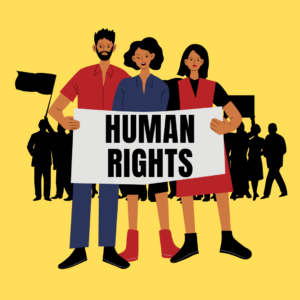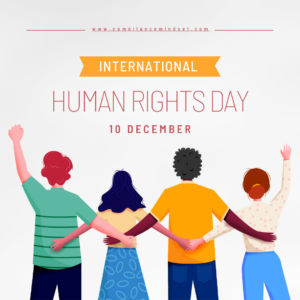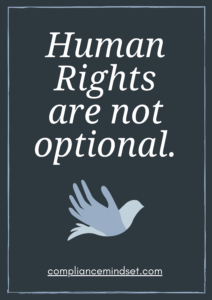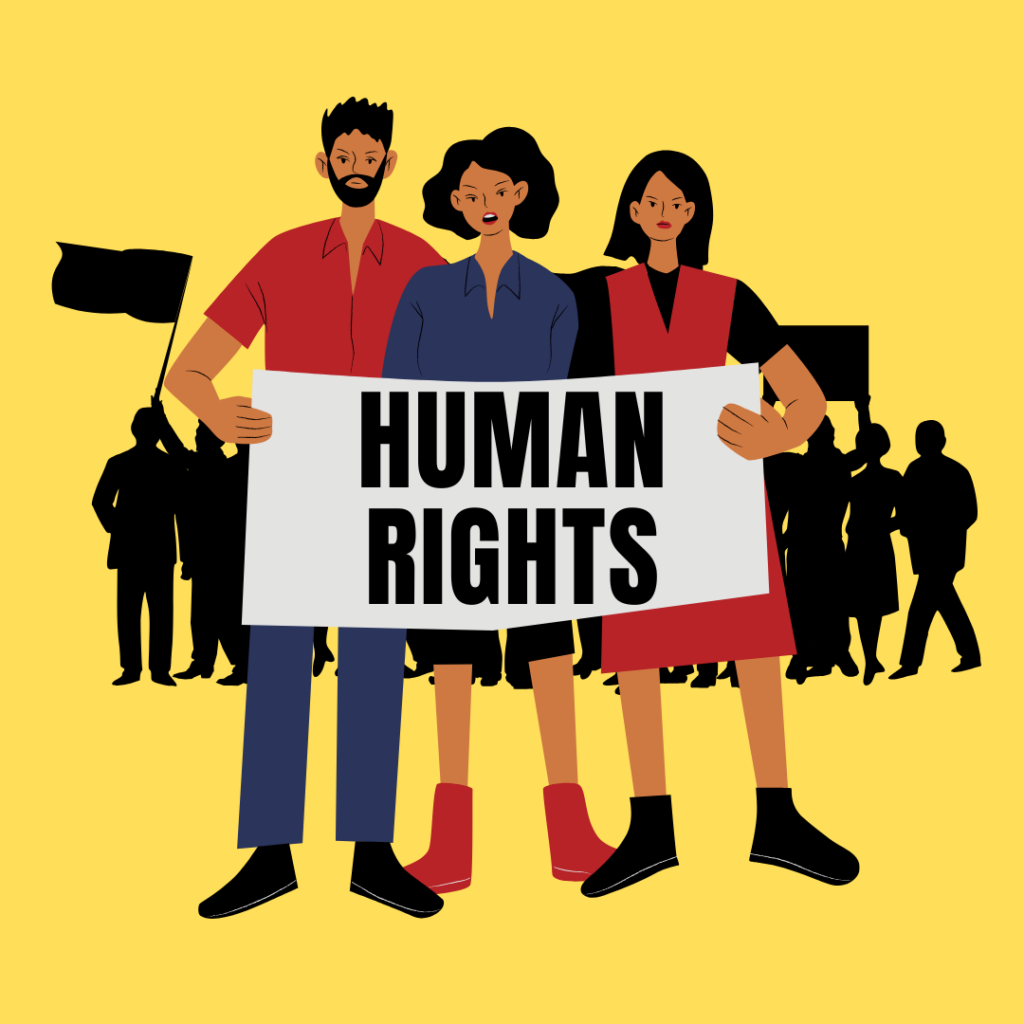2024 a Crucial Time to Strengthen Human Rights and Ethics Policies in Supply Chains – A Global Outlook
By: Cyn Hutchinson, JD.
Human Rights are Fundamental
In 2024, the global spotlight on corporate responsibility and human rights has intensified as consumers, regulators, and advocacy groups demand greater accountability in how organizations manage their supply chains. With growing evidence of human rights violations in regions such as Asia-Pacific (APAC), Latin America, Europe, Australia, and the United Kingdom, corporations must reassess their supply chain and procurement practices and implement robust human rights and ethics policies. The urgency to act now stems from increasing scrutiny, regulatory changes, and the long-term reputational, legal, and financial risks associated with non-compliance.

The APAC Challenge: A Hotbed for Human Rights Concerns
The APAC region, home to some of the world’s largest manufacturing hubs, has been at the center of controversies surrounding labor practices, including forced labor, child labor, and unsafe working conditions. Countries such as China, Bangladesh, Vietnam, and Malaysia play pivotal roles in global supply chains, producing everything from electronics and apparel to raw materials. Yet, these countries have faced significant challenges in enforcing labor standards.
APAC Supply Chains Spotlight
- Uyghur Forced Labor in China: In recent years, reports have linked major global brands to forced labor involving the Uyghur minority in China’s Xinjiang region. Companies sourcing products, textiles, electronics, and solar panels from this area face increasing pressure to sever ties unless they can demonstrate full transparency and compliance with ethical standards.
- Bangladesh Garment Industry: Despite improvements following the 2013 Rana Plaza disaster, which killed over 1,100 garment workers, unsafe conditions and low wages persist in Bangladesh’s garment industry. Brands sourcing from this region must address these ongoing issues to maintain credibility.
- Palm Oil Production in Malaysia and Indonesia: The palm oil industry has long been plagued by allegations of child labor, forced labor, and environmental degradation. In 2023, several U.S. companies faced bans on imports of palm oil products due to non-compliance with U.S. Customs and Border Protection (CBP) standards.
Europe: Strengthening Regulations and Sustainability
Europe has taken a leading role in enforcing corporate accountability. The European Union’s Corporate Sustainability Due Diligence Directive (CSDDD), requires businesses to identify, mitigate, and report human rights risks in their supply chains. Countries such as Germany and France have already implemented national laws, such as Germany’s Supply Chain Due Diligence Act (LkSG), setting high compliance expectations for global corporations operating in or sourcing from Europe.
Latin America: Addressing Labor and Environmental Exploitation
In Latin America, industries such as agriculture, mining, and manufacturing are often associated with labor exploitation, unsafe working conditions, and environmental harm. Countries like Brazil and Mexico are critical nodes in global supply chains, yet issues such as deforestation for cattle ranching and child labor in coffee production demand immediate corporate attention.
Australia: Modern Slavery Act in Action
Australia’s Modern Slavery Act 2018 requires companies with annual revenues exceeding AUD 100 million to report on their efforts to combat modern slavery. This law has catalyzed corporate transparency, but enforcement remains a challenge. Recent audits have revealed gaps in corporate reporting, emphasizing the need for more robust oversight and action.
United Kingdom: A Legacy of Leadership
The UK’s Modern Slavery Act 2015 set a precedent for corporate accountability. However, gaps in enforcement and voluntary compliance have led to criticism. In 2024, ongoing discussions about strengthening the Act highlight the importance of mandatory reporting and penalties for non-compliance.

Why 2024 is a Turning Point
- Increased Consumer Awareness:
Consumers are more informed than ever about the ethical implications of their purchasing decisions. Social media campaigns and investigative journalism have exposed unethical practices, making it harder for corporations to hide behind opaque supply chains.
- Regulatory Pressures:
Governments worldwide are introducing stricter regulations, such as the EU’s CSDDD and updated Modern Slavery Acts in Australia and the UK. Non-compliance is no longer an option, as legal and financial repercussions can be severe.
- Geopolitical Shifts:
Ongoing geopolitical tensions, such as those involving China’s labor practices, have added complexity to global trade. Companies must navigate these challenges while adhering to ethical standards.
- Technological Advancements:
Advancements in technology, such as blockchain and AI-driven analytics, make it easier to track and verify supply chain activities. Companies that fail to leverage these tools risk falling behind competitors who can demonstrate transparency and accountability.

Steps for Global Corporations to Strengthen Human Rights Policies
- Conduct Comprehensive Supply Chain Audits:
Corporations must map their supply chains, identifying high-risk regions and industries. Regular audits should be conducted, with a focus on ensuring compliance with international human rights standards such as the UN Guiding Principles on Business and Human Rights and ILO conventions.
- Implement Supplier Codes of Conduct:
Suppliers must adhere to clear ethical guidelines, covering labor practices, working conditions, and environmental impact. Non-compliant suppliers should face corrective actions or termination of contracts.
- Leverage Technology:
Tools like blockchain can enhance supply chain transparency by tracking the origin and movement of goods. AI-driven analytics can identify anomalies and flag potential violations in real-time.
- Establish Grievance Mechanisms:
Corporations must provide accessible and anonymous channels for workers and stakeholders to report human rights violations. These mechanisms should be backed by robust investigation and remediation processes.
- Monitor and Measure Progress:
Key performance indicators (KPIs) should be established to track the effectiveness of human rights initiatives. Metrics such as the number of supplier audits, grievance resolutions, and compliance rates should be regularly reviewed and reported.
- Invest in Training:
Employees and suppliers must be trained on human rights policies and ethical practices. Training programs should address regional nuances and emphasize the importance of compliance.

Apple’s Supply Chain Efforts – Making Strides
Apple, a major player in global electronics, has faced criticism for labor practices in its supply chain, particularly in APAC. However, the company has made strides in improving conditions by auditing suppliers, publishing annual Supplier Responsibility Reports, and addressing forced labor allegations in its supply chain. In 2024, Apple continues to focus on leveraging technology and collaboration to enhance transparency and compliance.
![]()
A Call to Action: The Time Is Now
In 2024, global corporations have both an ethical obligation and a business imperative to strengthen their human rights and ethics policies. The stakes are high—failure to act can result in legal penalties, reputational damage, and loss of consumer trust. By addressing human rights concerns in supply chains, particularly in high-risk regions such as APAC, Latin America, and beyond, corporations can lead the way in fostering a more equitable and sustainable global economy.
The time for complacency has passed. Companies must act decisively to ensure their supply chains reflect the values of transparency, accountability, and respect for human dignity. In doing so, they not only protect their own interests but contribute to a world where ethical business practices are the norm rather than the exception.

Human Rights & Ethics Program with Great Leadership is a Must at Global Corporations
Having a robust human rights and ethics program is not just a regulatory requirement but a moral and strategic necessity in today’s interconnected global economy. A dedicated program ensures that corporations can identify and mitigate human rights risks, foster ethical business practices, and maintain trust with stakeholders.
Here are key reasons why such programs are essential:
- Building Consumer Trust
In an age where consumers demand ethical products and services, a human rights program demonstrates a corporation’s commitment to values that resonate with its customers. Transparency in sourcing and ethical practices enhances brand reputation and customer loyalty.
- Risk Mitigation
Human rights violations in supply chains can lead to significant legal, financial, and reputational risks. A well-designed program helps corporations proactively address these risks by implementing due diligence processes, supplier audits, and grievance mechanisms.
- Driving Accountability
A comprehensive ethics program establishes clear standards for suppliers, employees, and stakeholders, fostering a culture of accountability. It ensures that violations are addressed promptly and transparently, reinforcing the company’s commitment to its principles.
- Leveraging Technology for Transparency
With tools like blockchain and AI, corporations can track supply chain activities in real-time, ensuring compliance with ethical and human rights standards. These technologies enable companies to detect and address issues before they escalate.
- The Role of Leadership
Effective leadership is the cornerstone of any human rights and ethics program. Leaders set the tone for organizational values, drive the implementation of initiatives, and inspire accountability across all levels. Great leaders understand the importance of aligning ethical practices with business objectives, ensuring that human rights are prioritized without compromising operational efficiency.
- Global Influence
Corporations with strong human rights programs have the potential to influence global supply chain.
Is your organization doing enough in the Human Rights domain?

